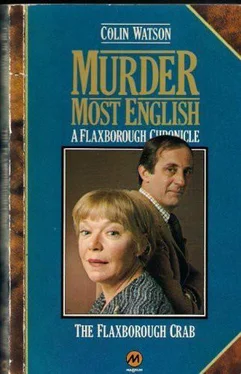The doctor led her gently to one of the chairs and stood looking down at her. He held her wrist for a few seconds, very lightly, then stooped to peer at her eyes. She caught a faint smell, not unpleasant, that was half-way between scent and disinfectant. As he examined her, Meadow hummed behind a wide but handsome mouth. Brenda thought he looked as if he shaved a lot: the tanned skin was so smooth that it reflected the light of the standard lamp behind her.
“Mmm, hmm,” said Meadow, wisely. He rubbed long, white, well-washed hands, and nodded. “Mm, hm.”
Brenda supposed this to signify that she had suffered no lasting harm.
“Hadn’t you better ring up, now?” she asked, anxiously.
“Ring up?” Meadow had turned his attention to a small pile of letters lying on a scalloped walnut table nearby.
“The police.”
“Ah,” said Meadow to the envelope on the top of the pile. He clearly was a man capable of thinking of two or three things at once. Brenda waited for him to go over to the pale pink telephone that she had spotted on a beautifully polished writing desk near the window.
He did, in fact, stroll over to the desk, opening his letter as he moved; but when he reached it, it was to pull out a little drawer. He came back with a phial in his hand, shook a white tablet on to the table, and wordlessly invited her to swallow it. The tablet looked and tasted like aspirin.
When it had gone down, not without difficulty, the girl said: “They could still catch him if you get on to them straight away.”
“Now, now—you mustn’t worry.” He was reading the letter, not looking at her.
She shifted to the edge of the chair, as if about to get up.
“Would you rather I telephoned? I don’t mind. The only trouble is, I can’t tell them what he looks like, and you can.”
Meadow laid aside his correspondence and gave her a big, concerned smile.
“Now, what is all this you’re bothered about, eh?”
He had a fruity, very nicely educated voice, she thought; surely he couldn’t be as thick as he pretended.
“The patient is our main concern, isn’t she? How is she feeling now, hmm?” He felt her forehead with the backs of his fingers and pouted judiciously.
“I’m very much better, thank you, and I would like you to telephone the police at once.”
He laughed and walked to the phone.
She heard him give the policeman at the other end of the line the bare facts of what had happened. It did not sound a very exciting account. Then, after a pause, he called out: “I say...” and she looked across to see him with his hand over the mouthpiece.
“They want to know your name and address.”
She told him. He repeated the words to his listener, enunciating them very clearly and with a faint smile as if there were something funny about being called Sweeting and living in Washington Road.
When he had put down the receiver, Meadow resumed reading his mail.
“They want you to stay here,” he told Brenda. “It seems that someone is coming round to ask you some questions.”
“But I can’t. Mum will be worrying her head off.”
“That’s all right: they’re letting your people know.” He had not looked up.
The girl continued to sit on the edge of her chair. She ruefully examined her holed stockings and twisted one foot to look at the damaged shoe. Then she noticed that a seam in her dress had been pulled apart. She tried to close the gap through which white nylon was showing.
The doctor, who had slipped the wrapper from a medical journal, was now leafing through it, apparently oblivious to her presence.
Five minutes went by. The girl sat hugging her knees and staring out through the big window. There was nothing to see but the trailing branch of a willow tree a few feet beyond the glass.
Suddenly she was aware of someone standing in the doorway. She turned.
A woman in an olive-green tweed suit was gazing at her with an expression compounded of inquiry and distaste. The woman was middle-aged and had a long, rather weather-beaten face. She looked energetic and determined to be neither persuaded nor amused by anyone on earth.
Her husband unhurriedly put down his magazine.
“This young lady,” he informed her, “has had a rather nasty experience.”
Mrs Meadow’s unchanged stare indicated her opinion that Brenda belonged to that group of young females for whom unpleasant experiences were customary nutriment.
“She is just having a little rest,” Meadow added, “until the police arrive.”
“The police!”
“Some fellow attacked her in the road outside here. They will want to ask her some questions.”
“Is there any reason why she can’t go to the police station? I mean, that is the usual procedure, isn’t it?” Mrs Meadow had entered the room and was searching for something in the drawer of a glass-fronted bureau.
“Mmm?” said the doctor. The medical journal was engrossing him once more.
Brenda felt very guilty at having disturbed the routine of two such busy and important people. She remembered now having seen frequent references in the Flaxborough Citizen to Mrs Meadow’s activities. She belonged to lots of things and was never photographed, indoors or out, without a hat—a sure sign of considerable social status.
The girl was about to suggest that perhaps she should go home now and call at the police station the next day, when she heard the mellifluous chimes of the Meadows’ three-tone front door bell.
No one made a move. Then Mrs Meadow murmured something over her shoulder about being Elizabeth’s night off. The doctor, still reading, strolled slowly out of the room.
He returned with two men.
One was Inspector Purbright.
The other was an individual whose patently mature bodily development was quite disconcertingly at odds with the face of a fourteen-year-old choir boy. This was Detective Sergeant Love, sometimes playfully referred to by his superiors as ‘whited-sepulchre Sid’.
Mrs Meadow acknowledged introductions with only the slightest tilt of the boulder of her face. The ordained role of the police, she considered, was the protection of private property; if young women insisted on indulging in the frivolity of getting raped, then that was no good reason for the diversion of the constabulary from its proper duties.
It was with Brenda, now pale and weary-looking, that Purbright concerned himself at once.
He glanced at the table beside her.
“Have you had something to drink?”
“I have given her a sedative,” Meadow said.
“Oh, but a hot drink...” The inspector looked across at Mrs Meadow. “Do you think something in that line could be managed? Tea, perhaps?”
Mrs Meadow was too surprised to produce indignation commensurate with the audacity of the request. “Well, it is rather awkward, actually. The maid...”
“No, no,” Purbright protested cheerfully. “The sergeant is awfully good at making tea. He’d be pleased to do it.”
Love beamed like a boy scout unexpectedly invited to demonstrate fire-craft in the middle of the sitting-room carpet.
“I don’t think that will be necessary,” said Mrs Meadow, already on her way to the door.
The sergeant took out his notebook and Purbright began asking Brenda quiet, gently phrased questions.
Dr Meadow listened.
Chapter Three
The inspector and the sergeant discussed the ordeal of Miss Sweeting.
It was the following morning.
As in the case of the attack upon the resourceful librarian, the search for the man responsible had been undertaken more as a gesture of helpfulness than with any hope of success. It had been quite fruitless. Heston Lane could have been as uninhabited as Gorry Wood for all the notice its sequestered residents had taken of the drama in their midst.
Читать дальше












